Key takeaways:
- Feedback sessions foster growth by providing diverse perspectives, helping storytellers improve their narratives and character development.
- Storytelling for kids enhances language skills, critical thinking, and empathy, supporting their overall development and fostering connections.
- Effective feedback should be specific, balanced with praise, and timely to promote a constructive dialogue and deeper learning experiences.
- Personal experiences with feedback reveal the value of vulnerability and collaboration, enabling richer storytelling through shared insights and creativity.
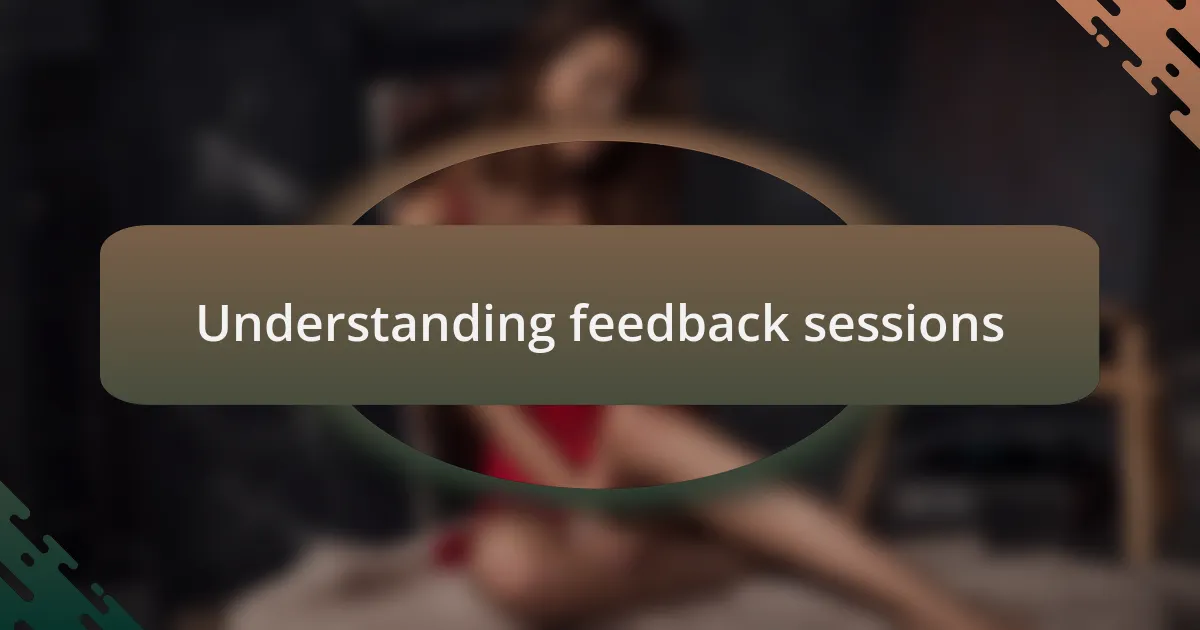
Understanding feedback sessions
Feedback sessions are a powerful tool for growth and understanding, especially in the context of storytelling for kids. I remember my first session; I was nervous but eager to hear what others thought about my tales. It felt a little like exposing my heart, but the supportive atmosphere turned that anxiety into excitement.
Have you ever considered how feedback can open up new avenues for creativity? During one session, a fellow storyteller pointed out how a character in my story could reflect the feelings of friendship better. At first, I was taken aback, but then I realized it was a lightbulb moment that reshaped my narrative.
Listening to diverse perspectives can be enlightening. Each piece of feedback is like a different lens through which to view our work. I cherish these moments when I see my stories evolve into something richer and more engaging because of the shared insights from my peers. It’s fascinating how collaboration in feedback sessions can breathe new life into our creative processes.

Importance of storytelling for kids
Storytelling is a fundamental part of a child’s development. I recall telling my little sister a bedtime story; her eyes lit up as she imagined the world I painted with words. This engaging activity not only sparked her imagination but also helped her to develop critical thinking and empathy as she considered the perspectives of the characters.
When kids listen to or tell stories, they learn valuable language skills. I remember struggling with my vocabulary as a child, but immersing myself in stories introduced me to new words and expressions. It’s remarkable how storytelling encourages children to communicate effectively, enhancing their ability to articulate feelings and ideas, which is essential for their social interactions.
Furthermore, storytelling fosters a sense of belonging and connection. In one instance, a group of children I worked with created a story together. Watching them build off each other’s ideas was truly heartwarming. It reinforced my belief that through shared narratives, kids not only bond with each other but also create lasting memories that shape their worldviews.
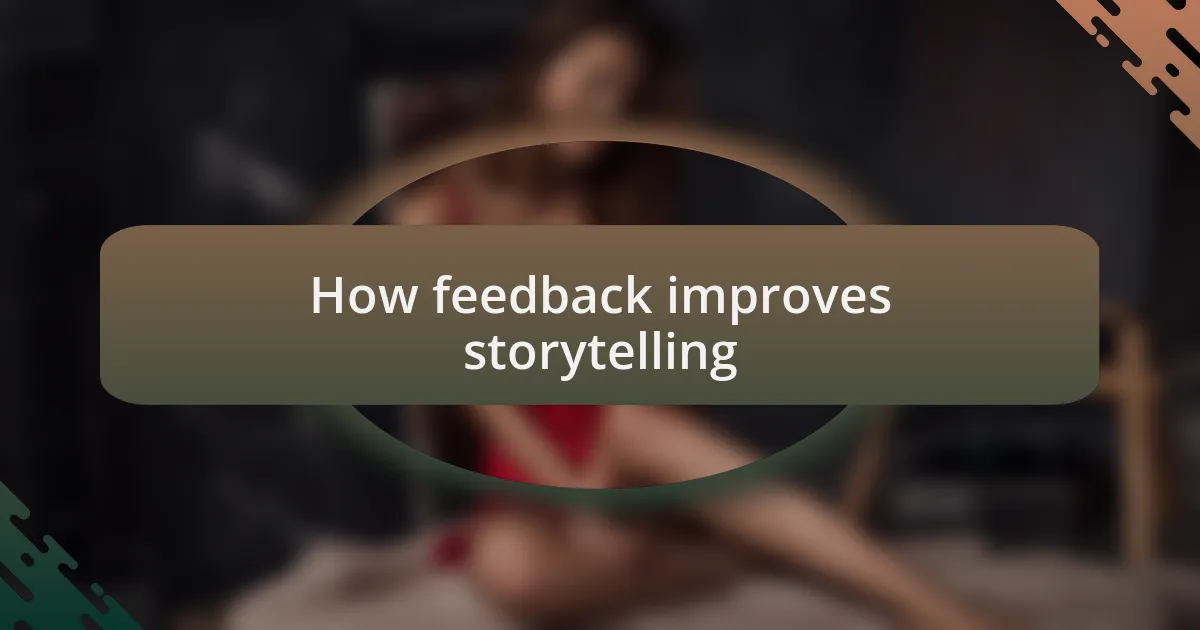
How feedback improves storytelling
Feedback plays a crucial role in enhancing storytelling skills. I remember when I shared a short story with my writing group; their constructive comments opened my eyes to aspects I hadn’t considered. Have you ever received feedback that made you see your work from a fresh perspective? That shift in understanding can transform a simple narrative into a compelling tale.
When children share their stories and receive feedback, it encourages them to reflect on their choices. I once saw a child who had crafted a wild adventure with their favorite animal. After hearing suggestions on character development and plot pacing, the child reworked the story into a much richer narrative. It’s fascinating how those insights can help kids refine their ideas, making them more confident storytellers in the process.
Moreover, active engagement through feedback creates a collaborative storytelling environment. I recall a workshop where kids exchanged their stories and provided insight to each other. Watching their excitement as they built on each other’s strengths was inspiring. This dynamic not only nurtured their creativity but reinforced the idea that storytelling is a shared journey, where everyone can contribute and grow together.
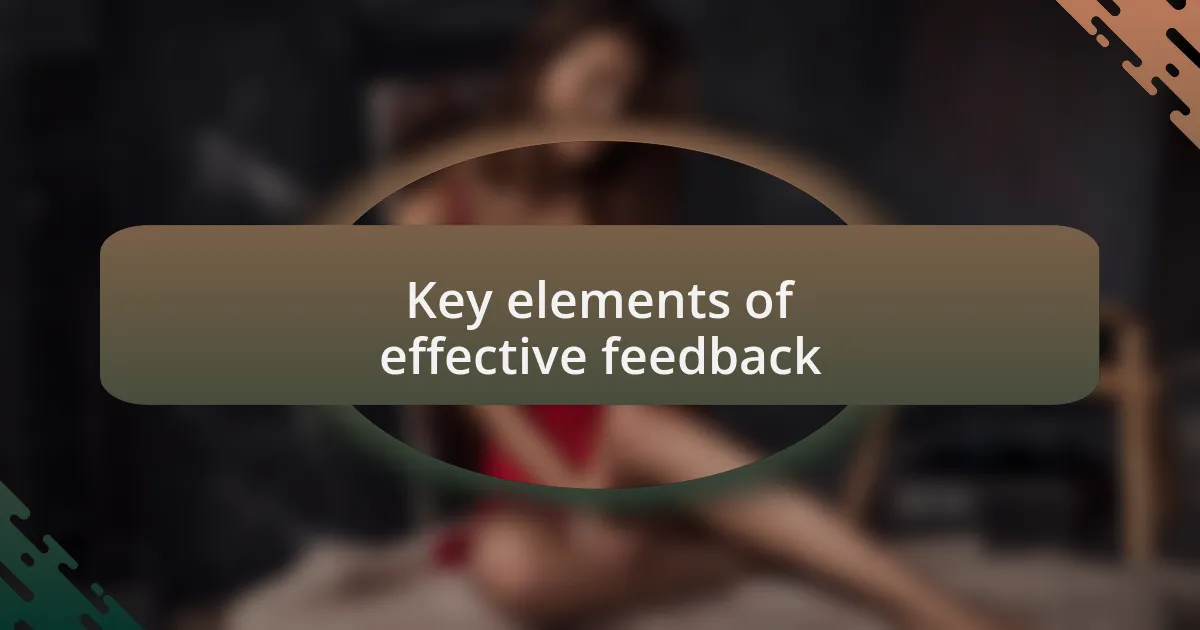
Key elements of effective feedback
Effective feedback thrives on specificity. I vividly remember a feedback session where a mentor pointed out not just what was wrong with my story but also which particular lines fell flat. This focus on specific elements helped me hone in on what really needed improvement, transforming vague critiques into actionable insights. Why is it that so often we settle for general feedback when the real magic happens in the details?
Another key element is the balance between praise and constructive criticism. I had a colleague once who always started our feedback sessions with something positive, which made it easier to digest the more challenging suggestions. It’s like giving a child their favorite treat before asking them to eat their vegetables; do you agree that this approach can soften the blow of criticism and encourage a more open dialogue?
Lastly, timely feedback is essential. I once participated in a storytelling workshop where we received feedback shortly after sharing our narratives. This immediacy sparked lively discussions while the stories were still fresh in everyone’s minds. Have you ever noticed how feedback can feel more impactful when it’s given right away? It allows for deeper connections to be made, enhancing the overall learning experience.
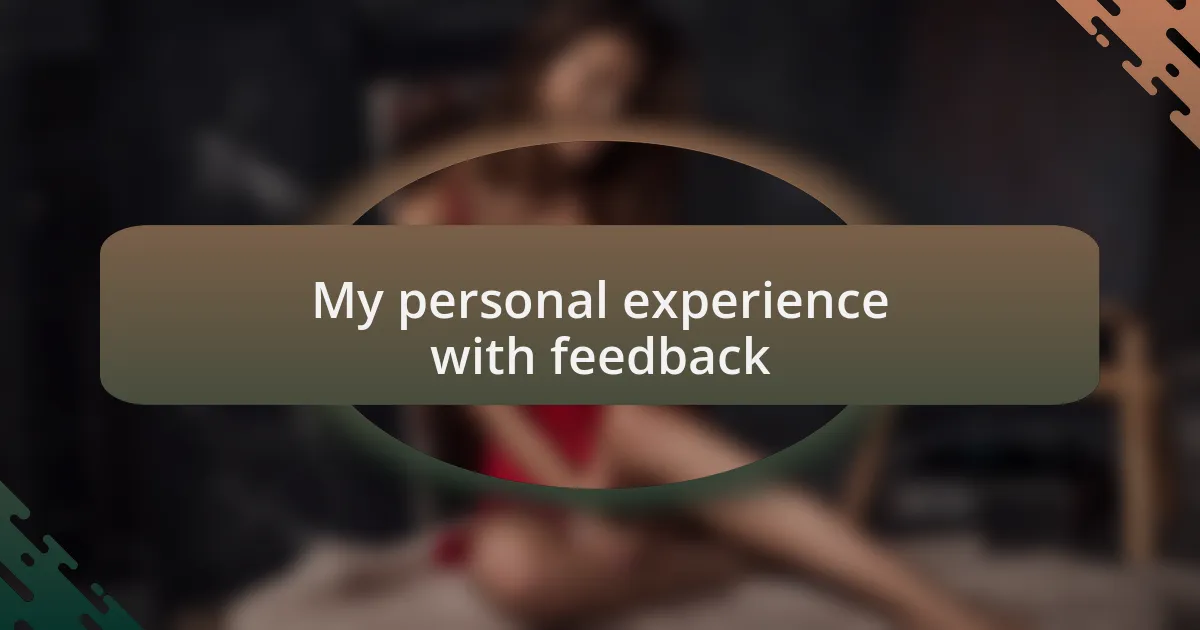
My personal experience with feedback
My personal journey with feedback has often felt like walking a tightrope. In one memorable session, I shared a story that I was particularly proud of, only to hear a peer mention they found it confusing. I remember that sinking feeling in my stomach, but then I realized their honesty offered me a chance to clarify my narrative. Have you ever experienced that initial sting, only to discover it led to something truly productive?
I find that the best feedback sessions are those where vulnerability is embraced. During one workshop, a fellow storyteller bravely opened up about the fears that shaped their story. This encouraged all of us to share not just our work, but also the emotions behind it. I was struck by how this openness fostered a supportive environment, making the feedback feel like a collaborative journey rather than an evaluation. Doesn’t that shared vulnerability open the door to richer discussions?
There have been times when I’ve left a feedback session feeling invigorated and other times quite the opposite. After receiving critical feedback on a story I had poured my heart into, I was initially disheartened. But reflecting on that critique later, I discovered it ignited a spark of creativity in me, pushing me to rewrite with greater depth. This rollercoaster of emotions made me wonder: how can we turn initial disappointment into motivation?
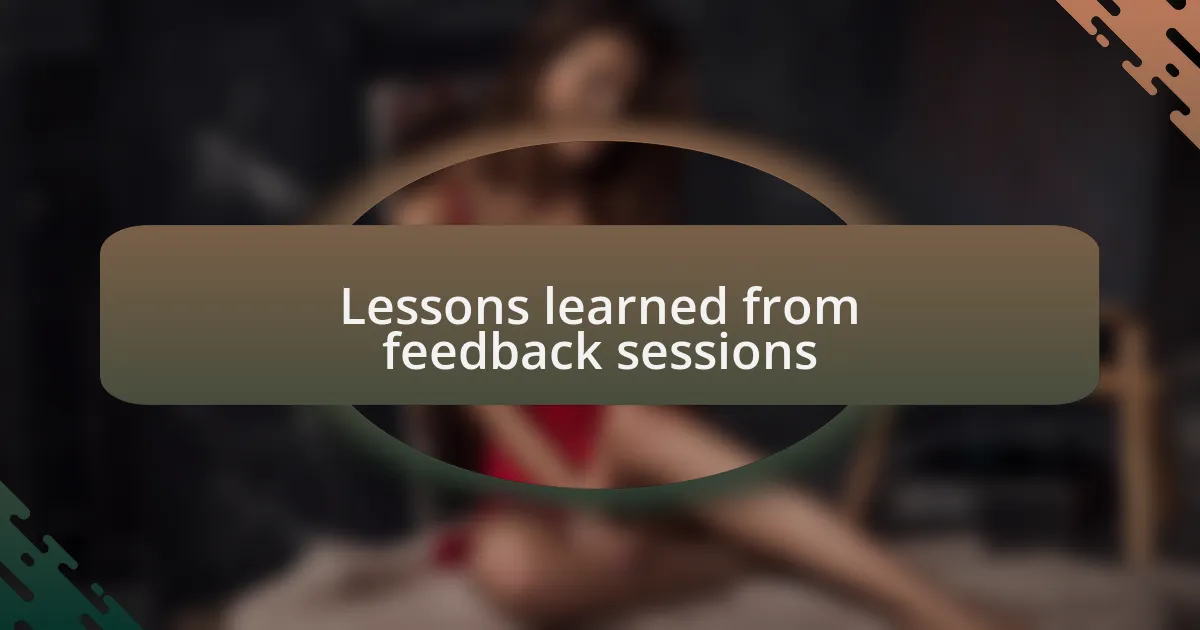
Lessons learned from feedback sessions
Feedback sessions have taught me the value of perspective. I remember one time when a colleague pointed out that my story lacked a clear theme. At first, I felt defensive, thinking I had crafted a compelling narrative. However, after taking their comment to heart, I realized they were right; the theme had become muddled. This moment underscored for me that feedback can offer a lens to see our work from a different angle—an essential tool for growth.
I’ve also learned that timing plays a crucial role in how feedback is received. In one session, a mentor shared insights on my pacing, but the way they presented it—calmly and at just the right moment—made all the difference. I took it as constructive guidance rather than criticism because it felt like a gentle nudge instead of a shove. Have you ever noticed how the delivery of feedback can transform our willingness to embrace it?
Lastly, I’ve come to appreciate the collaborative spirit in these sessions. In a recent feedback round, I shared a story infused with introspection, and one participant suggested weaving in humor. Initially, I was skeptical. However, collaborating on this idea not only lightened the narrative but also engaged my audience in unexpected ways. How often do we overlook the creative potential in others’ suggestions? This experience reinforced my belief that two (or more) minds can create something far richer than one alone.
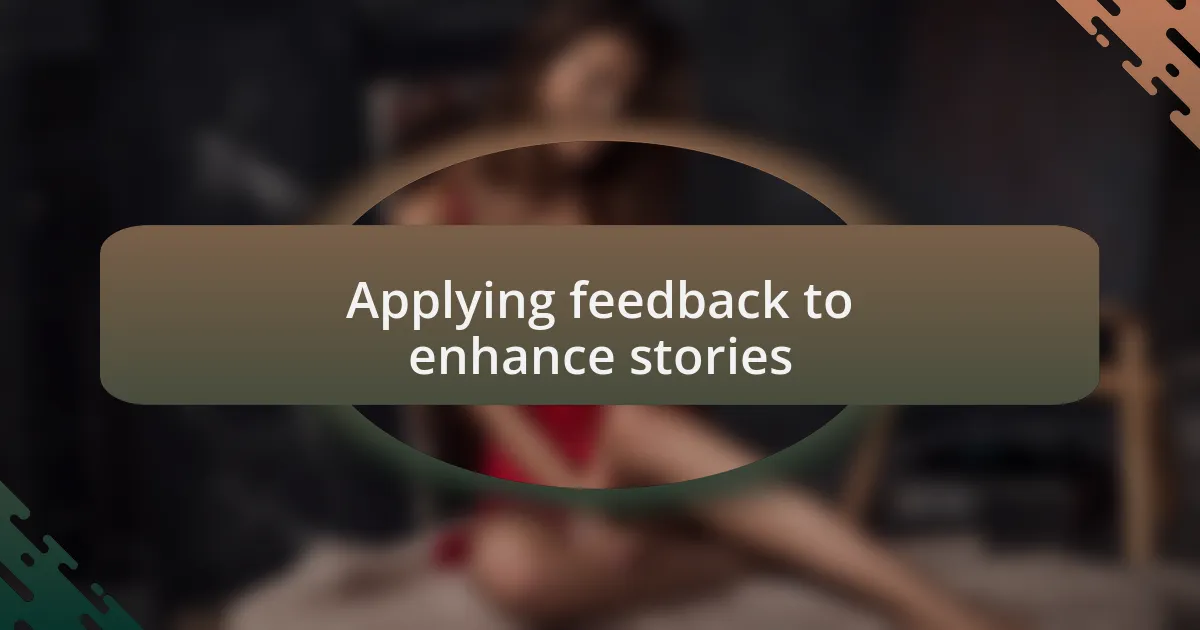
Applying feedback to enhance stories
When I first started incorporating feedback into my storytelling, I often felt hesitant. One particular session stands out where a fellow storyteller pointed out that a character I loved was, surprisingly, quite one-dimensional. At first, it stung a bit. But as I dove deeper into my character’s background and motivations, I discovered layers I hadn’t considered, ultimately breathing new life into my story. Isn’t it intriguing how someone else’s perspective can illuminate blind spots we didn’t even know were there?
I recall a moment when I decided to experiment with the pacing of a story after receiving feedback on its structure. A mentor had suggested that I break up dense passages with lighter, more playful scenes. I took a chance, adding an unexpected twist halfway through that caught both the feedback provider and my audience off guard in the best way. Seeing their faces light up was an exhilarating reminder of how feedback can guide us toward creative risks that really pay off. Have you ever taken a leap based on someone else’s insight?
Embracing constructive criticism also taught me the importance of revisiting my stories. After taking a week to reflect on various suggestions from a feedback session, I sat down to rework a story that felt almost complete. With fresh eyes, I removed certain clichés that had snuck in through familiarity and infused it with the new ideas that had sparked during our discussions. I realized then that art is not static—it’s a living entity that flourishes with each thoughtful edit. How often have you looked back and cringed at your old drafts, only to find excitement in transforming them with what you’ve learned?